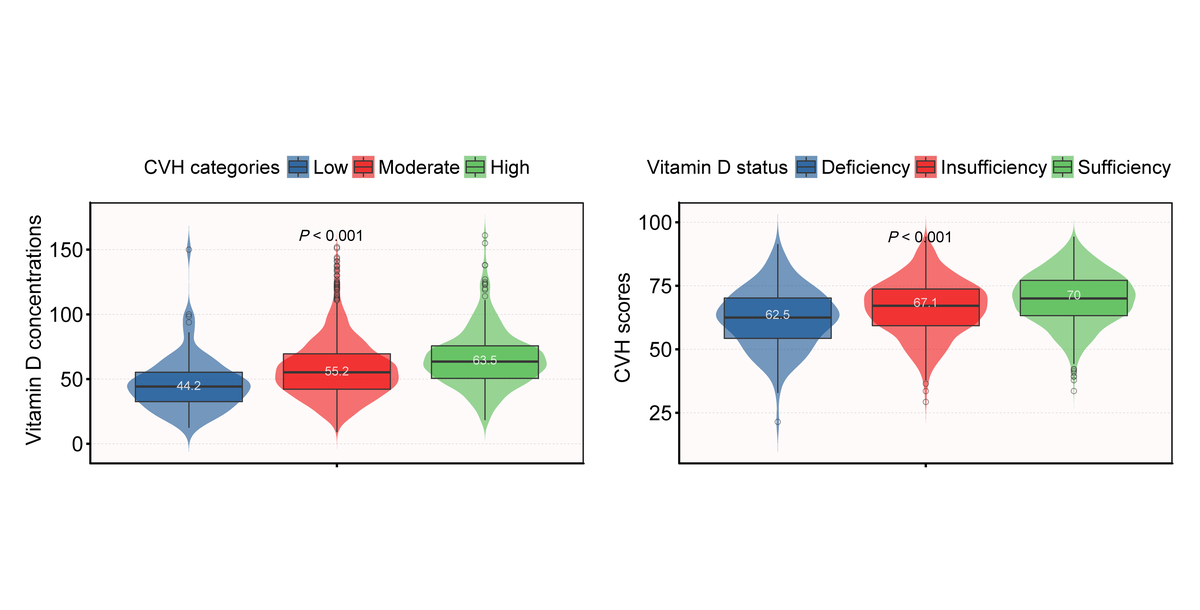Current issue
Archive
Manuscripts accepted
About the Journal
Editorial office
Editorial board
Abstracting and indexing
Subscription
Contact
Ethical standards and procedures
Most read articles
Instructions for authors
Article Processing Charge (APC)
Regulations of paying article processing charge (APC)
CARDIOVASCULAR PREVENTION / RESEARCH PAPER
Association between Serum Vitamin D Concentrations and Life's Essential 8 score in American adolescents
1
Wenzhou People's Hospital, China
2
Wenzhou Yebo Proctology Hospital, China
These authors had equal contribution to this work
Submission date: 2024-02-26
Final revision date: 2024-05-07
Acceptance date: 2024-05-30
Online publication date: 2024-06-06
KEYWORDS
TOPICS
ABSTRACT
Introduction:
This study sought to use the latest Life's Essential 8 scoring tool to obtain information on the relationship between serum vitamin D concentration and adolescent cardiovascular health (CVH).
Material and methods:
A total of 1,819 teenagers aged 16–19 were enrolled. Associations between serum vitamin D concentrations and CVH ratings were estimated using multiple linear regression and multinomial logistic regression methods, and the dose–response relationship was examined by restricted cubic spline analysis.
Results:
After adjusting for all confounding factors, serum vitamin D concentrations were positively correlated with CVH scores (β=0.12; 95% CI: 0.09-0.14, p<0.001). Among the sex and race subgroups, the correlation was stronger in male, Mexican American and Non-Hispanic Black participants, with ORs of 1.05 (95% CI: 1.03-1.07), 1.06 (95% CI: 1.04-1.08), p=0.002), 1.07 (95% CI: 1.03-1.11), 1.09 (95% CI: 1.05-1.14), p=0.01, 1.04 (95% CI: 1.01-1.06), and 1.05 (95% CI: 1.02-1.09), p=0.01, respectively. Serum vitamin D concentrations had a nonlinear relationship with CVH ratings. CVH scores grew with serum vitamin D concentrations up to the inflection point (86 nmol/L) (β=0.17 (95% CI: 0.135-0.206, p<0.001). When serum vitamin D concentrations exceeded 86 nmol/L, CVH scores were not associated with serum vitamin D concentrations.
Conclusions:
The study identifies a nonlinear relationship between serum vitamin D levels and CVH in US adolescents aged 16-19, with an inflection point at 86 nmol/L. These findings underscore the importance of vitamin D in adolescent cardiovascular health and suggest the need for targeted health strategies, particularly in high-risk groups such as male, Mexican American, and Non-Hispanic Black teenagers.
This study sought to use the latest Life's Essential 8 scoring tool to obtain information on the relationship between serum vitamin D concentration and adolescent cardiovascular health (CVH).
Material and methods:
A total of 1,819 teenagers aged 16–19 were enrolled. Associations between serum vitamin D concentrations and CVH ratings were estimated using multiple linear regression and multinomial logistic regression methods, and the dose–response relationship was examined by restricted cubic spline analysis.
Results:
After adjusting for all confounding factors, serum vitamin D concentrations were positively correlated with CVH scores (β=0.12; 95% CI: 0.09-0.14, p<0.001). Among the sex and race subgroups, the correlation was stronger in male, Mexican American and Non-Hispanic Black participants, with ORs of 1.05 (95% CI: 1.03-1.07), 1.06 (95% CI: 1.04-1.08), p=0.002), 1.07 (95% CI: 1.03-1.11), 1.09 (95% CI: 1.05-1.14), p=0.01, 1.04 (95% CI: 1.01-1.06), and 1.05 (95% CI: 1.02-1.09), p=0.01, respectively. Serum vitamin D concentrations had a nonlinear relationship with CVH ratings. CVH scores grew with serum vitamin D concentrations up to the inflection point (86 nmol/L) (β=0.17 (95% CI: 0.135-0.206, p<0.001). When serum vitamin D concentrations exceeded 86 nmol/L, CVH scores were not associated with serum vitamin D concentrations.
Conclusions:
The study identifies a nonlinear relationship between serum vitamin D levels and CVH in US adolescents aged 16-19, with an inflection point at 86 nmol/L. These findings underscore the importance of vitamin D in adolescent cardiovascular health and suggest the need for targeted health strategies, particularly in high-risk groups such as male, Mexican American, and Non-Hispanic Black teenagers.
We process personal data collected when visiting the website. The function of obtaining information about users and their behavior is carried out by voluntarily entered information in forms and saving cookies in end devices. Data, including cookies, are used to provide services, improve the user experience and to analyze the traffic in accordance with the Privacy policy. Data are also collected and processed by Google Analytics tool (more).
You can change cookies settings in your browser. Restricted use of cookies in the browser configuration may affect some functionalities of the website.
You can change cookies settings in your browser. Restricted use of cookies in the browser configuration may affect some functionalities of the website.



